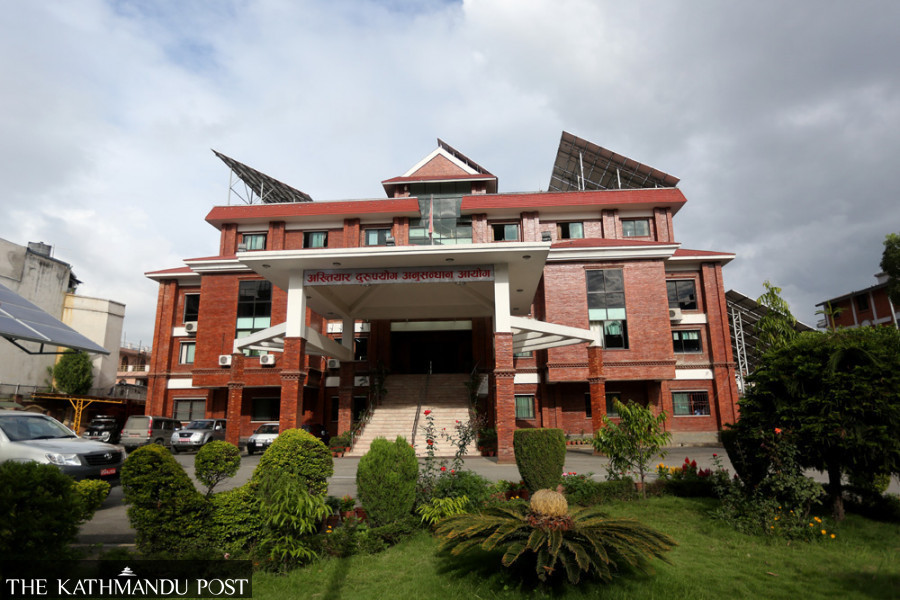National
Anti-graft body files Rs1 billion graft case against three for granting illegal tax waivers
Chudamani Sharma, Lumba Dhwaj Mahat and Umesh Dhakal face corruption charges for a second time in nearly four years.
Prithvi Man Shrestha
The Commission for the Investigation of Abuse of Authority on Wednesday filed an additional corruption case at the Special Court against former officer bearers of the Tax Settlement Commission for allegedly causing financial losses to the state while settling tax liabilities of dozens of businesses.
Former Director General of the Inland Revenue Department Chudamani Sharma, who was a member of the Tax Settlement Commission, its chairperson Lumba Dhwaj Mahat and member Umesh Prasad Dhakal again face corruption charges for a second time in nearly four years in the same scam.
The anti-graft body on Wednesday filed the case accusing them of embezzling over Rs1 billion.
The spokesperson of the anti-graft body, Narayan Prasad Risal, said a new case was filed against the trio as the earlier investigation had not incorporated all the decisions taken by the Tax Settlement Commission.
"The fresh corruption case was brought after investigating the tax settlement conducted by the commission regarding additional taxpayers," he said.
The first case filed four years ago included tax settlements involving 46 taxpayers. “Now this new case was brought after investigating tax waivers granted to 71 additional taxpayers,” said Risal. “This is the final case regarding the scandal.”
According to a press statement issued by the Commission for the Investigation of Abuse of Authority (CIAA), the officer bearers of the Tax Settlement Commission settled tax liabilities of the business enterprises with malafide intention as they prioritized personal benefits to cause harm to the state.
According to the CIAA, tax liabilities of many enterprises were waived based on negotiations with the taxpayers without following the criteria for tax waiver set by the Tax Settlement Commission Act. “The bad intention of the commission’s office bearers has been exposed as they overstepped their jurisdictions and settled the taxes with a malafide intention,” said Risal.
Earlier, on July 16, 2017, the CIAA had filed cases against the trio on the charge of embezzling Rs10.02 billion in the same episode. That was the largest corruption case ever filed at the court by the anti-graft body.
The Tax Settlement Commission, formed in February 2015, had run into controversy after a report of the Office of the Auditor General in April 2016 called into question the Rs 21 billion tax exemption granted to various enterprises.
The CIAA investigation shows the commission had given tax waivers even to the enterprises that were willing to pay their tax dues. Even those firms which had missed the deadline to apply for tax settlement were given tax waivers by assigning prior dates to their applications, according to CIAA officials.
As per the Tax Settlement Commission Act, which has now been scrapped, the commission could handle tax disputes only after such cases were withdrawn from the Revenue Tribunal. However, the commission was found to have settled taxes of several enterprises that had not withdrawn their appeals from the Revenue Tribunal, according to the anti-graft body.
In an earlier investigation it was found that the commission had also waived the Value Added Tax (VAT) liabilities even though VAT is paid by customers and business enterprises have the responsibility to deposit it to the state coffers. Even those who were involved in a fake VAT receipt scandal in the past were granted tax waivers by the commission.
The auditor general's report had also questioned the intent of the commission’s office bearers after they were found to have waived almost all tax liabilities of some businesses. Some firms had been granted tax waivers of over 99 percent.
The auditor general’s report also said that most of the enterprises were granted tax exemptions not because their disputes had reached the court but they were instead unwilling to abide by the instructions of the tax authorities. The CIAA had initiated investigation into the matter after the then parliamentary Public Accounts Committee instructed it to do so following a discussion on the auditor general's report.
This is the third corruption case against Sharma, a former director general of the Inland Revenue Department.
Besides two corruption cases involving tax settlement, the anti-graft body in January 2018, had filed yet another corruption case against Sharma on the charge of amassing property amounting to Rs 42.95 million, which the commission said was disproportionate to his known sources of income. The CIAA probe found only Rs36.37 million of Sharma’s property was earned from legal sources.




 15.96°C Kathmandu
15.96°C Kathmandu















